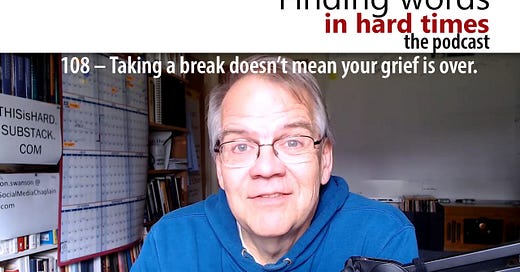061 - A gathering of resources for busy people.
Welcome back (or welcome)!
This week isn’t one long essay. Instead, I’m suggesting one podcast, one article, one book, and one request to help you be more comfortable as you help others in hard times.
The podcast: Finding Words in Hard Times - the podcast.
This is my podcast, with audio available on Apple Podcasts. Originally weekly, now biweekly, I’m trying, simply and quietly, to offer support for you as you support others.
I’m thinking that the video version on YouTube may be just as helpful as the audio version. And I’m learning that people are sending these videos to people who need to see someone talking with them.
In case you haven’t taken a look, here are the last three episodes:
Taking a break doesn’t mean your grief is over. Just because you laugh, doesn’t mean everything is all better.
You don’t need to be strong for anyone else. “I would love to have future generations know that feelings are great, that tears are a perfect response to deep loss, that Jesus was willing to listen and weep and talk with his grieving friends.
You can be as strong or as weak as you need to be, but you don’t have to do it for anyone else.”
It’s okay that you can’t think right now. “Almost every time I’m in a room after a death (I’m a hospital chaplain), someone will talk about not being able to think clearly. A name will disappear from their memory, a story will lose its way. In today’s episode we’ll talk a little about that. And I read from my book, This is Hard, what I say to people who can’t think. (It’s understandable).”
Finding Words in Hard Times – the podcast on Youtube
Finding Words in Hard Times – the podcast on Apple
+++
An article: learning to walk after grief.
Lauren DePino says, “Grief made me lose my balance. Here's how I learned to walk forward again.”
“Grief can creep into our lives, months — even years — after our loved one has died. It can besiege our most joyfully anticipated experiences until we no longer see them as joyful. Not until we pay grief the attention it seeks can we live again.”
+++
A book: The Grieving Brain.
The person Lauren DePino talked with for support is Mary-Frances O’Conner. I referenced her last week when I was talking about metaphors.
O’Conner, Mary-Frances. The Grieving Brain: Surprising Science of How We Learn from Love and Loss. HarperOne2022.
It’s possible that I found this book because of a connection to the Dual Process Theory of Coping with Bereavement. O’Conner talks about bereavement science from a neurology perspective. She notes the lack of research support for the stages of grief model many of us are familiar with, and then points to the Dual Process Model as a far more useful way to understand our journey in grief.
At the heart of this book is the idea that grieving is a kind of learning. Though, as she points out, not like learning a skill. “This type of learning,” she writes, “is like traveling to an alien planet and learning that the air cannot be breathed, and therefore you have to remember to wear oxygen all the time. … Grief changes the rules of the game, rules you thought you knew and had been using until this point.” (209).
As a neuroscientist and psychologist and grieving human being, she’s done research on grief from the inside and outside. Two decades ago, she was part of the first fMRI (functional MRI) project to look inside the brains of people to see how they responded to grief.
This book is an easy-to-read summary of that research.
A couple ideas that stood out to me:
Yearning – “At its most basic, yearning is wanting a person to be here again now.” 131
This concept at the heart of some grief explains our feeling, even when we know, cognitively and spiritually, that it may not be possible or helpful. Even when we believe they are “better off now”. We still yearn. Because we are human.
Reminders - “Our brain is constantly generating reminders. It is an organ built to manufacture thoughts the way the pancreas manufactures insulin.” 130.
So when we find ourselves remembering our loved one seemingly at random, our brain is doing what we did the whole time the person was alive - remembering them.
A request: share, comment, and review.
If a book or video is helpful, liking or leaving a review is a tremendous way for others to know that this resource is helpful and why.
If a newsletter is helpful, forwarding it is a way to help others be helped.
If a body of work has been helpful, supporting the creator offers encouragement and resources for further writing and research.
+++
I’m taking a break next week. I’ll see you in two weeks.
Jon







